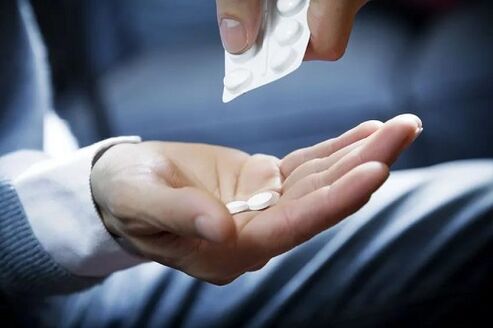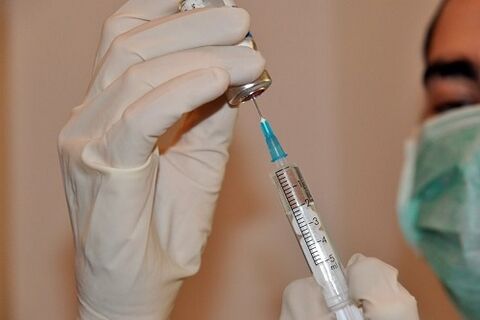Treatment of prostatitis in men includes the use of drugs and physical therapy. Phytotherapy, gland massage, acupuncture can be used as additional methods for patients. This is a comprehensive approach that not only prevents the disease from getting worse, but also gets rid of it completely. Medication for prostatitis is always given during the course and is only prescribed after a complete examination of the prostate.

Medications for prostatitis are only effective if prescribed correctly by a doctor.
fixed assets
Typically, urologists prescribe several types of medications to patients with prostatitis. This allows you to deal with diseases that arise in the prostate more quickly. To improve her condition, antibacterial and immunostimulatory drugs, muscle relaxants, hormonal drugs, and alpha blockers are used.
After a thorough study of the analysis and ultrasound results, the attending physician develops an individual treatment plan for each patient.

It is impossible to choose a medication for prostatitis on your own, as this can lead to worsening not only the condition of the prostate, but also the overall health.
Treatment of chronic prostatitis with antibiotics is not always indicated. This group of drugs can be omitted if the patient has no symptoms of the disease and is feeling normal. In this case, chronic prostatitis can be treated with herbal remedies and alpha-blockers.
Antibacterial drugs
When infections such as chlamydia are detected, fluoroquinolones can be used, which have high bioavailability and can penetrate the prostate mucosa in the shortest possible time.
After prostatitis is detected, the patient is prescribed medication, including antibiotics. The treatment plan is chosen by the doctor according to the patient's condition.
In cases where fluoroquinolones do not have the desired effect, your doctor may prescribe a course of other drugs. If during the examination, laboratory tests show the presence of chlamydia, the patient is advised to use tetracycline. Their effectiveness is related to the rapid penetration of the active ingredient of the drug into the prostate gland and the inherent property of the drug to destroy pathological microorganisms as quickly as possible.
With repeated treatments, doctors developed a new regimen of taking antibiotics, which often included lower doses, before treating men with prostatitis recurrences with drugs. If the selected drugs are ineffective, it may mean that they are not suitable for the patient or are not being prescribed correctly.
Only when pathogenic microorganisms are the cause of prostatitis, it is necessary to use preparations with antibacterial effect.
It should be remembered that bacteria are almost always present in the human body in one way or another. During the normal functioning of the immune system, they are inactive and pose no particular threat to health. The weakening of the immune system under the influence of other stimuli leads to the activation of pathogenic microbial communities, which penetrate prostate tissue and lead to acute disease.

The acute phase of bacterial prostatitis requires the use of antibacterial agents. Without this treatment, the inflammatory process may spread to the bladder, urethra, and kidneys. There is evidence of a relationship between bacterial prostatitis and urolithiasis. Lack of antibiotic treatment can lead to a chronic form of the disease, which is more difficult and longer to treat.
Appointment principle
In acute prostatitis, the drug is prescribed immediately after the general examination and questioning of the patient. As a rule, urologists don't wait for test results, but prescribe a regimen of taking macrolides, fluoroquinolones, and aminoglycosides on the first day. Less commonly, patients are prescribed erythromycin antibiotics because these drugs cannot cause mass destruction of bacterial microbes.
After the urologist receives the test results, the doctor may change the treatment plan or add other drugs to it. It is reasonable to use only one drug in mild prostatitis. When choosing a drug, the age of the man and the presence of other diseases must be taken into account. If the patient has liver or kidney disease, the dose can be adjusted according to the degree of organ dysfunction.
The patient must notify the urologist of any medications he is taking or has recently taken.
If for some reason a person drinks antibiotics, doctors should take this fact into account, as these drugs may not be effective.

If the generic regimen assigned to the patient does not have the desired effect, another regimen with a stronger effect may be used. To enhance the effect, antibiotics are prescribed in the form of injections, so patients with acute prostate inflammation can be hospitalized. Treatment of prostatitis at home is carried out with antibacterial drugs in the form of capsules. In this case, it is extremely important to follow all the rules for receiving such funds. Treatment may not be effective if you deviate from the plan. Cancellation or extension of courses can only be done by a doctor.
Usually, properly selected antibacterial drugs give a positive effect on the third day after the start of the intake. If symptoms persist, a visit to a urologist to review treatment options is necessary.

Hormonal preparations and suppositories
A properly prescribed drug regimen can help reduce the symptomatic features of prostatitis. First, the discomfort of prostatitis during urination begins to disappear. Pain, bladder emptying problems, and erectile dysfunction may persist when the inappropriate medication is used. In some men, there was a gradual decline in potency. Many times the disease relapses without immunomodulators in the treatment regimen.
Hormonal drugs are prescribed to patients in the absence of positive results in the treatment of chronic prostatitis. They help relieve inflammation and restore erections.
Although effective, these drugs can have many side effects, so they should be used with caution and strictly in the dosage recommended by your doctor.
With inflammation of the glands, rectal suppositories can also be used as adjuvants. Such suppositories are generally well tolerated by patients because they contain natural ingredients. Means based on honey, propolis, a complex with anti-inflammatory and antiseptic herbal extracts with good results.
Rectal suppositories help relieve swollen glands, reduce pain and normalize microcirculation.
Today, in pharmacies, you can buy suppositories or tablets based on sublimated bovine prostate. They improve the structure of prostate tissue, relieve inflammation and help speed up the regeneration process.
To restore the body and strengthen the immune system, which is usually weakened after prostatitis, a complex containing vitamins and trace elements can be used. Antioxidant medications may also be recommended to patients to help prevent BPH and the development of malignant tumors.



























